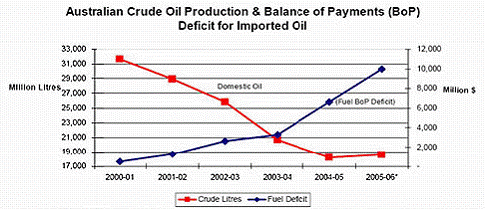At the beginning of June, John Howard announced that former Telstra boss Ziggy Switkowski will chair a Federal Government inquiry into nuclear energy in Australia. The announcement exhibited all the elements of policy being made on the run - two of the inquiry’s members could only be announced the day after. It apparently took a bit longer than anticipated to round up a reliable bunch.
All of this happened immediately after Howard’s visit to Washington in May. It doesn’t take much wit to imagine the conversations at the White House. “Johnny, we want you to give the nuclear can a kick. Australia is perfect as a source of uranium, and as a disposal site for nuclear wastes.” So Howard now wants a debate on energy issues, where all the options are supposedly “on the table”. He suddenly thinks global warming is a pressing issue - and he has the solution.
The only problem is that by opening up energy options for debate, Howard risks uncovering a lot more than he is bargaining for.
Advertisement
Nuclear energy is an expensive pursuit - one nuclear power plant would cost around $3 billion to build. We already have it on the Federal Treasurer’s authority that it is an “industry” we are talking about - not just a single plant - and that no carbon taxes can be expected on coal-fired power stations to make nuclear “competitive”. That can only mean public subsidies for nuclear - on a massive scale. A domestic nuclear industry of three plants, built over ten years, would cost the Australian public billions of dollars in subsidies. And that’s just for construction. We will also have to cough up to subsidise generating costs - not to mention security for the dangerous byproducts produced.
All this for an industry that will not fill any petrol tanks, or solve Australia’s escalating oil import headaches (see graph).

The rising cost of imported oil to Australian taxpayers
Crude oil & petroleum products represent 60 per cent of current BoP deficit Source: Renewable Fuels Association.
In comparison, alternative energy sources such as biofuels promise better traction on greenhouse gases, can make a direct contribution to solving the oil import problem and reducing the rising costs of fuel, and require no public subsidies at all.
Let’s compare the numbers. A bio-reactor that uses sugarcane and produces about 100 million litres (ML) of ethanol per year costs investors just over $100 million. And these are real investors - Australian farmers.
Let’s say we mount a national biofuels project to build ten such bio-reactors every year for the next ten years. The sugarcane fields would extend throughout Queensland and northern NSW and would be supplemented by grain and new crops, such as sweet sorghum. Ten bio-reactors would produce 1,000 ML of ethanol per year, at a total investment of $1 billion per year. Over ten years, the $10 billion project would be producing 10,000 ML of fuel per year. That’s nearly one third of current Australian transport consumption of 35,000 ML per year, making a huge dent in our oil import bill.
Advertisement
What’s more, the bio-reactors could use crushed cane as their energy source, so there is no net energy consumption. And they would produce valuable (instead of dangerous) by-products, such as wet distillers’ grains from grain-fed reactors, which are ideal as cattle feed. The end-waste could then be bio-digested into methane, producing more energy as well as excellent fertiliser to go back onto the cane fields. It would all be ecologically self-contained.
What’s more, all of this investment would come from the private sector and would kick-start a great export industry. A huge boost would be generated for rural employment in building and operating the bio-reactors. There would be no need for any public subsidies at all (but some relaxation of government taxation through fuel excise rebates).
All that would be needed to kick-start the process would be a sensible increase in the mandatory biofuels target to be met by the oil industry - as called for by Renewable Fuels Australia. What blocks the nascent industry at the moment is the veto power of the foreign oil majors - and in Australia they dominate the petrol distribution industry.
Currently the biofuels target is set at the ludicrously low level of 350 ML per year - just one per cent of current consumption. And it’s not mandatory.
If it is correct that the Howard Government has been elected through an unspoken pact with the public to keep petrol prices down, then surely here is Howard’s weakest point - and Labor’s best option.
What are you doing, Kim Beazley? When will Labor make the rising cost of imported oil to Australian taxpayers the centrepiece of its campaign? When will you back a drastic increase in the biofuels mandatory target - agreed upon by the oil majors and enforced - and tell the punters how much it will save them at the petrol pump?
Here we have a solution to greenhouse gas emissions that is much more appealing than Howard’s nuclear option. All it requires is a mandatory biofuels target to be set in law - one that the oil majors have to meet, set by a prime minister who is prepared to stand up to them.